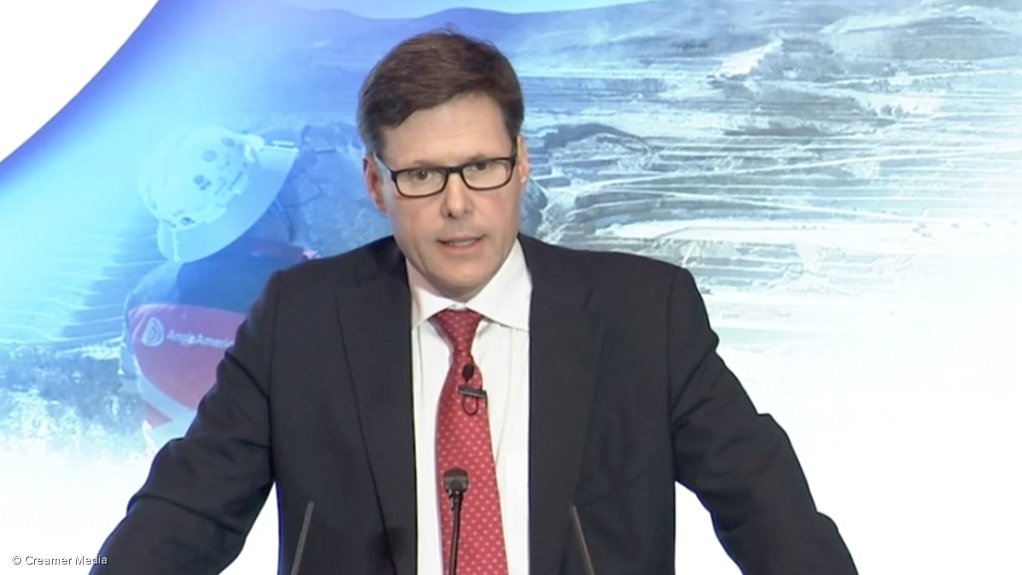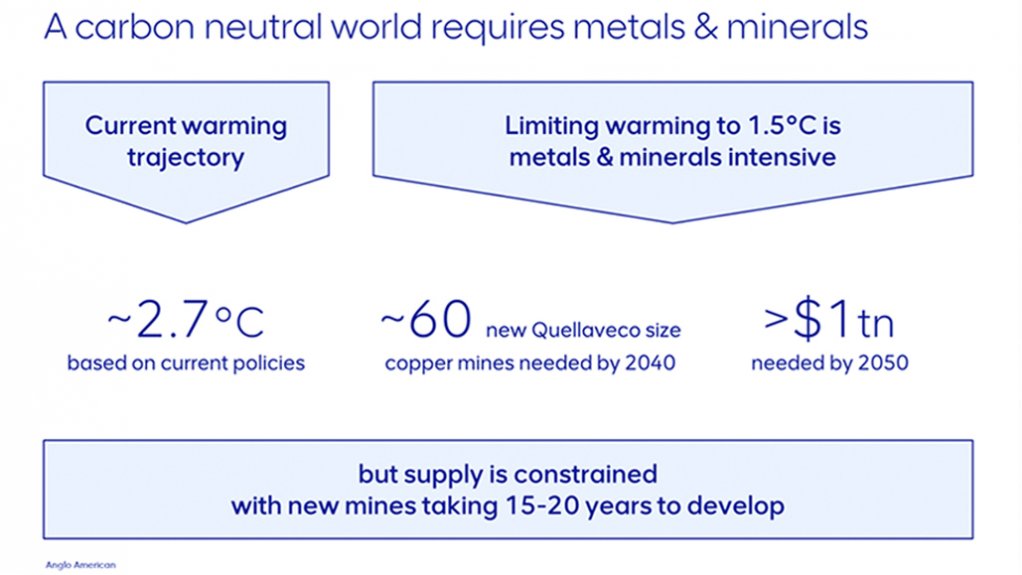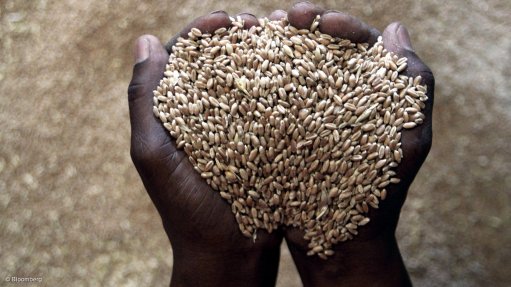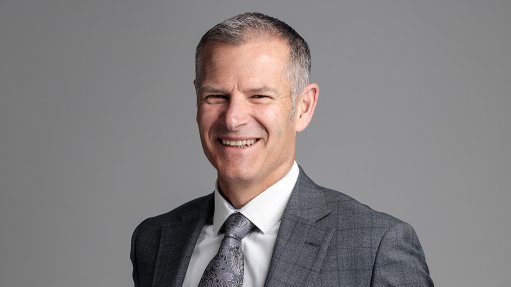World warming at rate well above what Paris Agreement requires, Anglo CEO warns



Anglo American CEO Duncan Wanblad.
Photo by Creamer Media
World not heading for 1.5 °C Paris Agreement.
JOHANNESBURG (miningweekly.com) – The world is on a trajectory to reach 2.7 °C of warming above pre-industrial levels, which is quite a long way mathematically from the 1.5 °C that is required by the Paris Agreement.
This was pointed out by Anglo American CEO Duncan Wanblad, quoting independent sources such as Climate Action Tracker.
The current warming trajectory of 2.7 °C is based on current policies.
Limiting warming to 1.5 °C is metals and minerals intensive, with an estimated 60 new copper mines the size of Anglo's Quellaveco in Peru needed by 2040 and a $1-trillion investment needed by 2050 amid supply being constrained.
“It was a tough year with extreme weather… there are disruptions that we’re seeing more frequently in extreme weather events,” said Wanblad, following the release of the London- and Johannesburg-listed company’s second-highest set of 2022 financial results following its record performance in 2021.
Anglo had a level 3 water discharge incident at the Polokwane smelter in Limpopo.
The ponds that store the water for the circulation of operating water were relatively full owing to the smelter’s furnace being down.
Several days of multi-day storms then resulted in the water overflow.
“Lots to learn out of that,” said Wanblad.
Water constraints in Chile, where Anglo mines copper, have had to be mitigated at the Los Bronces mine.
In addition to extreme weather events, are permitting issues across the world, grade declines and fiscal uncertainty.
“All of that is going to continue to serve to put an extraordinary amount of pressure on metals intensity and the use of the metals and minerals. The ‘so what’ of all of that is that it still feels that we are structurally headed towards higher pricing in the future."
The Paris Agreement is a legally binding international treaty on climate change. It was adopted by 196 parties to the twenty-first Conference of the Parties at the UN Climate Change Conference (COP21) in Paris, France, on 12 December 2015. It entered into force on 4 November 2016.
Its overarching goal is to hold “the increase in the global average temperature to well below 2 °C above pre-industrial levels” and pursue efforts “to limit the temperature increase to 1.5 °C above pre-industrial levels.”
However, in recent years, world leaders have stressed the need to limit global warming to 1.5 °C by the end of this century.
That’s because the UN’s Intergovernmental Panel on Climate Change indicates that crossing the 1.5 °C threshold risks unleashing far more severe climate change impacts, including more frequent and severe droughts, heatwaves and rainfall.
To limit global warming to 1.5 °C, greenhouse-gas emissions must peak before 2025 at the latest and decline 43% by 2030.
The Paris Agreement is a landmark in the multilateral climate change process because, for the first time, a binding agreement brings all nations together to combat climate change and adapt to its effects.
Implementation of the Paris Agreement requires economic and social transformation, based on the best available science. The Paris Agreement works on a five-year cycle of increasingly ambitious climate action -- or, ratcheting up -- carried out by countries. Since 2020, countries have been submitting their national climate action plans, known as nationally determined contributions (NDCs). Each successive NDC is meant to reflect an increasingly higher degree of ambition compared to the previous version.
Recognising that accelerated action is required to limit global warming to 1.5 °C, COP27’s cover decision requests parties to strengthen the 2030 targets in their NDCs to align with the temperature goal by the end of 2023, taking into account different national circumstances.
Although climate change action needs to be massively increased to achieve the goals of the Paris Agreement, the years since its entry into force have already sparked low-carbon solutions and new markets. More and more countries, regions, cities and companies are establishing carbon neutrality targets. Zero-carbon solutions are becoming competitive across economic sectors representing 25% of emissions. This trend is most noticeable in the power and transport sectors and has created many new business opportunities for early movers.
By 2030, zero-carbon solutions could be competitive in sectors representing over 70% of global emissions.
Comments
Press Office
Announcements
What's On
Subscribe to improve your user experience...
Option 1 (equivalent of R125 a month):
Receive a weekly copy of Creamer Media's Engineering News & Mining Weekly magazine
(print copy for those in South Africa and e-magazine for those outside of South Africa)
Receive daily email newsletters
Access to full search results
Access archive of magazine back copies
Access to Projects in Progress
Access to ONE Research Report of your choice in PDF format
Option 2 (equivalent of R375 a month):
All benefits from Option 1
PLUS
Access to Creamer Media's Research Channel Africa for ALL Research Reports, in PDF format, on various industrial and mining sectors
including Electricity; Water; Energy Transition; Hydrogen; Roads, Rail and Ports; Coal; Gold; Platinum; Battery Metals; etc.
Already a subscriber?
Forgotten your password?
Receive weekly copy of Creamer Media's Engineering News & Mining Weekly magazine (print copy for those in South Africa and e-magazine for those outside of South Africa)
➕
Recieve daily email newsletters
➕
Access to full search results
➕
Access archive of magazine back copies
➕
Access to Projects in Progress
➕
Access to ONE Research Report of your choice in PDF format
RESEARCH CHANNEL AFRICA
R4500 (equivalent of R375 a month)
SUBSCRIBEAll benefits from Option 1
➕
Access to Creamer Media's Research Channel Africa for ALL Research Reports on various industrial and mining sectors, in PDF format, including on:
Electricity
➕
Water
➕
Energy Transition
➕
Hydrogen
➕
Roads, Rail and Ports
➕
Coal
➕
Gold
➕
Platinum
➕
Battery Metals
➕
etc.
Receive all benefits from Option 1 or Option 2 delivered to numerous people at your company
➕
Multiple User names and Passwords for simultaneous log-ins
➕
Intranet integration access to all in your organisation




















